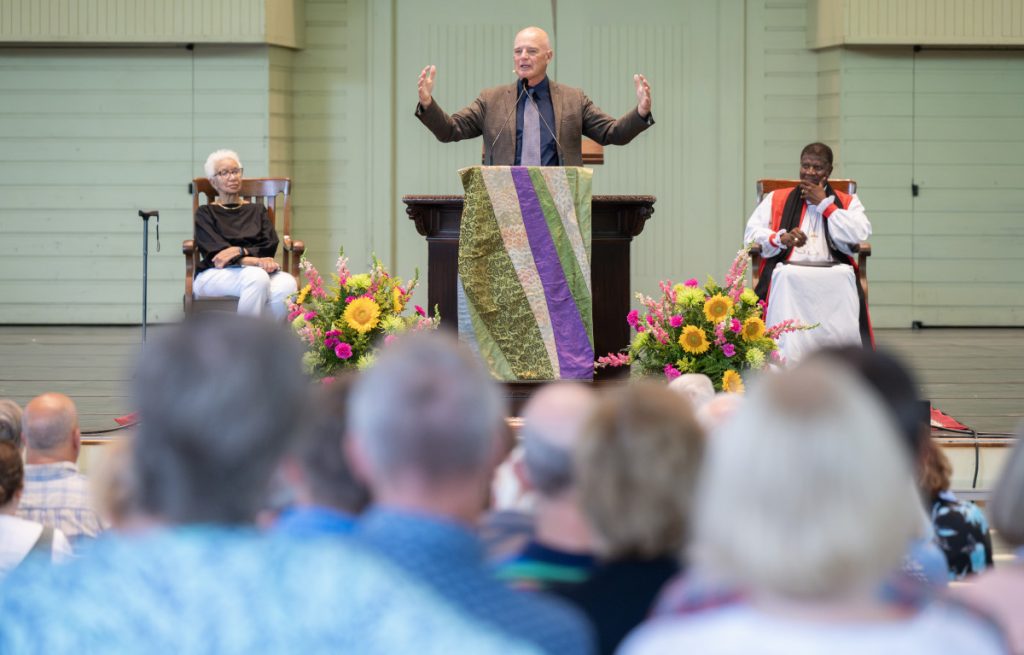
Column by Mary Lee Talbot
“To own a tradition requires us to not just keep doing what our ancestors did, but to imitate their wisdom. What they did for their time, we need to be equally wise in deciding what to do for our time,” said the Rev. Brian McLaren. “But we are so far from this now.”
He preached at the 9:15 a.m. Monday morning worship service in the Amphitheater. His sermon title was “The Biblical Law as Traditioned Innovation,” and the scripture reading was Leviticus 25: 1-12.
McLaren began his sermon recalling the words of Chief Seattle, a chief of the Duwamish and Squamish people, in a speech he gave on March 11, 1854. Seattle was speaking to the colonizers who saw him as a savage but one person kept notes on the speech and almost 30 years later published them.
In his speech, Chief Seattle said: “Human kind has not woven the web of life. We are but one thread within it. Whatever we do to the web, we do to ourselves. All things are bound together. All things connect. What is human kind without the beasts? If all the beasts were gone, human kind would die from a great loneliness of spirit. For whatever happens to the beast soon happens to humanity. All things are connected. This we know. The earth does not belong to us. One thing we know which the white man may one day know, our God is the same God. You may think now that you own God as you wish to own our land, but you cannot. God is the God of all people and compassion is equal for all. This earth is precious to God and to harm the earth is to heap contempt upon the creator. So love it as we have loved it. Care for it as we have cared for it. And with all your mind and with all your heart, preserve it for our children and love as God loves us all.”
McLaren connected this speech with the first chapter of Genesis that served as the scripture for his Sunday morning sermon. The 12 tribes of Israel, he said, became agriculturalists and they needed increased organization. “They needed written law to keep the wisdom but also to help them innovate,” he said.
The reading from Leviticus is a call to care for the land, McLaren told the congregation. The land deserves a rest, but instead of reciprocity with the land, humans have lost the sense of mutual care and connection. “Domination and transaction are the values we have today. The old values that the land and the beasts have intrinsic value has been reduced to money.”
While McLaren was living in the Washington D.C. area, he got to know economist Herman Daly. Daly has been called the “father of environmental economics.” McLaren said Daly laughed about that title because it was misunderstood. The title reads that the environment is a subset of economics, but Daly believed that the economy was a subset of ecology.
“This passage in Leviticus that we heard today, many people think ‘Oh, that’s this boring law stuff.’ Listen. This is revolutionary,” McLaren said. “If the leaders of our country and world understood this today, everything would be revolutionized, because what Leviticus tells us is that ecology is over economics. Economics should be arranged around the deeper truth of ecology, of care for the earth, of care for the land. Not economy rules and ecology has to fit in under its value system, but ecology rules, caring for the earth rules.”
He continued, “In the Genesis story, human beings are told to till and care for the earth. Tilling — economy. Caring for — ecology. There is a balance. So it is worth it to shut down the economy once every 50 years to be sure that the ecology gets a chance to recharge and revive.”
We are more concerned about the economy today, McLaren told the congregation, “and Christians should be angry and heartbroken. This priority will have disastrous effects for our children and grandchildren.”
McLaren wrote about what happens when we do not take care of the earth in his book Life After Doom, a reflection on what happens when we don’t honor the earth, when we don’t honor the tradition of caring for the earth as a sacred reality, with a value that cannot be measured by the economy. It has to be measured by the human spirit, by the human culture and the human society.”
There are a few examples, like Pope Francis, who heard the cries of the poor and the cries of the earth. McLaren called economic valuing of the earth “overshoot,” where the goods and services are pumped out of the earth and waste is pumped in. “We don’t give the land a rest, we leave a poorer, dirtier earth than we inherited. Do you see the wisdom? As Christians we should be brokenhearted, but Christians have erased, eradicated Indigenous tradition with theological justifications.”
McLaren said, “Economy has become absolute. The economy is our god. We write ‘In God We Trust’ on the piece of paper that is actually the God we often trust. Jesus told us we can’t serve two masters. Chief Seattle knew what the ancient Hebrews knew — that divine wisdom does not treat the earth as disposable. Or, as that economist Herman Daly said, ‘We should not treat the earth as if it were going out of business and we could sell everything offered to the highest bidder.’ ”
Anyone who puts economy over ecology is not wise, McLaren told the congregation — “whether he’s a president or a senator or a representative or the richest man in the world. These are people who have lost the wisdom of our tradition,” he said.
He pleaded with the congregation, “For the love of God and for the love of our children and our grandchildren, we have to recover the wisdom of our deepest tradition. In our hearts, do we put economy over ecology? Or do we put ecology as the big reality in which the human economy must take place?”
He closed by saying, “If you’re thinking, ‘Boy, that preacher was political today,’ I want to tell you what I’m saying is a spiritual truth. And anyone who defines spirit as not caring for the earth has no idea what spirit is.” The congregation applauded.
The Rt. Rev. Eugene Taylor Sutton, senior pastor for Chautauqua Institution, presided. Maggie Brockman, former co-host of the Hall of Missions, read the scripture. The prelude, performed by Owen Reyda, was “Andantino,” by Eugéne Gigout, played on the Massey Memorial Organ. The Motet Choir sang “Teach me, O Lord,” music by Philip W.J. Stopford and text from Psalm 119:33-39. The choir was under the direction of Joshua Stafford, director of sacred music and Jared Jacobsen Chair for the Organist, and accompanied by Reyda on the Massey Organ. The postlude, performed by Stafford on the Massey Organ, was “Fanfare,” by Percy Whitlock. Support for this week’s chaplaincy and preaching is provided by the Robert D. Campbell Memorial Chaplaincy and the Daney-Holden Chaplaincy Fund.




